Graham Reid | | 24 min read

Last week, late-night US television host Jay Leno quipped about a matter diverting American attention - the long-awaited US$8 million ($13.85 million) memoirs of Hillary Rodham Clinton.
"Hillary Clinton's book hits the stores this Monday," he said. "Oh boy, it took her a long time to write it. But in her defence, every time she tried to use the desk, Bill was always using it for a date."
Inevitably when the 550-page tome thumps on the table, you turn to the index for "Lewinsky, Monica". And there she is, referenced on about a dozen pages. More than Yasser Arafat, the combined Koreas or the Oklahoma City bombing. About the same as Bosnia actually.
But beyond the Monica affair which almost rendered the Clinton presidency impotent, a more interesting story is played out in the engaging, if often superficial, Living History.
Hillary Clinton is a remarkable - and remarkably durable - figure in American politics. She was often the only woman in the room and was clearly the smartest there, even if it was only her and Bill. She has the survival instincts of a mongoose and, while she doubtless had research assistance, Living History is a clever book which weaves the personal and political in a readable account of recent history. She never strays far from the common touch and an endearing anecdote.
She writes a lot about her changing hairstyles and likens her high school years in the early 60s to Happy Days and Grease, admitting she was president of the local fan club for Fabian, and Paul McCartney was her favourite Beatle.
"Years later when I met icons from my youth, like Paul McCartney, George Harrison and Mick Jagger, I didn't know whether to shake hands or jump up and down squealing."
Frankly you can't imagine that from the determined, poised lawyer of subsequent pages. But it conveys a winning innocence.
However, in the subtly self-serving introduction you detect the whiff of a powerful subtext. She emphasises her extensive international travel - 78 nations - and later reinforces how America must listen to the world with a saying she learned from the Masai in Kenya: "What you don't learn from your mother, you learn from the world."
These sentiments, admirable and true, must be read in the context of an ambitious senator now under a neo-conservative President who was woefully ill-informed about the world when he took office and until recently had barely set foot outside the continental US.
Senator Clinton kneecaps herself - unless she is being ironic, which seems unlikely - when she speaks of her early years after World War II when "the United States had saved the world from fascism", a reductive assessment of history more typical of Bush.
Yet she writes in an informal and informative manner. Her prose is lean and lively, if gooey romantic in places, and typically gets to the point quickly.
Inside a flattering, gold-embossed cover with a photograph which recalls Mario Testino's elegant black and white portraits of Princess Diana, she tells of her origins in the conservative middle-class Mid-West and the journey to the White House with her liberal Democrat husband. She identifies herself with her highly politicised generation of women who had been steeled in the fires of 60s activism.
"Classmates of mine," she writes, "have said that Wellesley was a girls' school when we started and a women's college when we left. That sentiment probably said as much about us as it did the college."
Or more clumsily, she positions herself as an emblem of her age: "While Bill and I talked about social change, I embodied it." Ouch.
So when she embarks on a litany of iconic moments in the US social landscape, she manages to place her emotions in the foreground.
On Vietnam: "Even though as a woman I knew I couldn't be drafted, I spent countless hours wrestling with my own contradictory feelings." .jpg)
On the murder of Martin Luther King: "[It] filled me with grief and rage. Riots broke out in some cities. The next day I joined the massive march of protest and mourning at Post Office Square in Boston. I returned to the campus wearing a black armband and agonising about the kind of future America faced."
On the killing of Robert Kennedy: "[It] deepened my despair about events in America."
On protests at the Democratic Convention in Chicago: "I knew that despite my disillusion with politics, it was the only route in a democracy for peaceful and lasting change. I did not imagine then I would ever run for office, but I knew I wanted to participate as a citizen and activist."
For the cynic, such recollections reinforce the obvious intent to convey that Hillary cares, and cares very deeply, about her country. There is, however, little reason to doubt it as she was politically active in high school where she unsuccessfully ran for president against the boys (there's a moral here, of course).
She admits she arrived at college carrying her father's Republican beliefs and her Democrat mother's dreams of social justice, but left with beginnings of her own ideas.
She spoke at her 1969 graduation ceremony - the first student invited to do so - and quotes from it. It is a mature, forthright exploration of the confusion of her generation, an attempt to "come to grasp with some of the inarticulate, maybe even inarticulatable things we're feeling".
She gained a standing ovation - and some opprobrium which she reflects was a preview of things to come.
When she entered Yale Law School she was one of only 27 women out of the 235 students, heard some of the finest legal and political minds lecture and shifted her focus to children's rights (Hillary cares?). Her first scholarly article was published in the Harvard Law Review, then she met "the person who would cause my life to spin in directions I could never have imagined".
The bearded Bill - "looking more like a Viking than a Rhodes scholar returning from two years at Oxford" - comes off as an immediately charismatic figure.
They go to a Mark Rothko exhibition and discuss 20th-century art, she invites him to a party being held by her ethnic Chinese roommate from Burma where he is quiet despite being able to converse on anything from African politics to country and western music. She asks why and he says with great charm: "I was interested in learning more about you and your friends".
Hillary recalls all this with great affection. Bill singing her Elvis songs and asking her to marry him while on holiday in the Lake District are lovely snapshots. Later there are heart-warming stories of daughter Chelsea as a child.
But suspend cynicism - they are stories anyone would tell and will resonate with her readership.
Then the days get difficult. Bill runs for governor, then President. There is gossip and more hairstyles. The Republican hawks circle. There is scandal and innuendo. She closes down the allegation Gennifer Flowers had a lengthy affair with Bill: "He told me it wasn't true." 'Nuff said? Obviously not.
Hillary Clinton is nothing if not courageous. In her early 20s she was in south Texas trying to get suspicious young Hispanics to register to vote. She takes on famous legal minds. Even before Bill, she was in the footnotes of history as part of the legal team working to impeach Richard Nixon.
"I couldn't imagine a more important mission at this juncture in American history," she says. Then Nixon resigns and "some of us on the committee staff came away from the experience sobered by the gravity of the process". Yes, Senator Clinton always cared about the US and democracy.
There are many reasons why Hillary Rodham Clinton wrote these memoirs. Not the least is money. An abiding theme is blaming enemies of the Clinton Administration. It's payback time in print.
But it is also a very American thing to exorcise your demons in public in the expectation of being forgiven.
Hers is guilt by association with a flawed if charismatic husband who now seems on the periphery of her life, although she says: "Even after all these years, he is still the most interesting, energising and fully alive person I have ever met. Bill Clinton and I started a conversation in the spring of 1971, and more than 30 years later we're still talking."
Some would say that's because Bill has given them quite a bit to talk about.
While Living History does not answer difficult political questions, she ensures there is a lot to admire. She is gutsy and hard working, and beneath the well-groomed exterior is one tough momma.
She survived Gennifer Flowers and Paula Jones, the failure of her healthcare plan and the Whitewater imbroglio, and Monica Lewinsky.
She is a woman of interesting contradictions - she supports Gerald Ford's pardoning of Richard Nixon, said she wasn't one to be standing by her man but has - and this memoir is courageous. It is published while there are many who can, and want, to contradict her version of history.
Her version, as might be expected, does not want for interesting or odd anecdotes about the rich and powerful either. Boris Yeltsin sounds a generous if somewhat peculiar host. During a 1994 reception at the new Russian Embassy in Washington he sliced the ear off the stuffed piglet on the banquet table and offered it to Bill before scoffing one himself.
"[Yeltsin] loved to tease me, and this was one moment when I was glad that a sow has only two ears."
Years later when both Boris and Bill were in their final days of office they had one last dinner together at the Kremlin. Boris, in a rumbling conspiratorial voice, said how much he would miss Hillary.
"I have a picture of you in my office, I look at it every day," he said mischievously before announcing a special treat for her.
She waited through the courses until the end when her pungent surprise was brought out. Floating in the bowl of soup were gelatinous rubber band shapes.
Yeltsin paused dramatically before announcing: "Moose lips."
While the Clintons could not be protected from unusual food, their security teams ensured unusual animals were kept at a distance - even when not necessary.
On a tour of Australia they visited the Governor-General Sir William Deane and were admiring the Deanes' vast, empty lawn. Lady Deane turned to Bill and apologised about the kangaroos, saying they thought they had caught them all, puzzling Bill.
"Oh dear," she said. "We were told to get all the kangaroos off the lawn because if one of them came near the President it would cause an allergic reaction."
Bill wasn't known to be allergic to kangaroos - or cut flowers, which were cleared off tables at a reception in France because President Mitterand's staff had been told by an over-zealous and ill-informed security service that he was.
And there is Hillary's own humour, like the time she made a five-minute film parody of Forrest Gump written by Saturday Night Live comedian Al Franken for a White House dinner. She sat on a bench with a box of candy on her lap and said, impersonating Tom Hanks' Gump voice: "My mama always told me the White House is like a box of chocolates. It's pretty on the outside, but inside there's lots of nuts."
Living History is peppered with such anecdotes, necessary leavening between her relentless attacks on enemies, perceived or real. She is a woman who can laugh at the absurdities, but clearly does not forget small slights or big betrayals.
Her publishers can be assured she will be hawking this book with the same ruthless but engagingly steely determination as comes through in these self-serving but always interesting pages.
As Craig Kilborn said: "There's a cold front moving across the country. Yeah, it's Hillary starting her book tour."
Bill Clinton's story laced with snake oil (New Zealand Herald, June 2004)
In the window of Whitcoulls this week has been a teaser for one of the most ballyhooed books - other than Harry Potter - of recent years, the autobiography of former US president Bill Clinton, My Life.
The sign reads: "Power, politics and really great sax."
As an ad campaign that's not bad: pithy, memorable, and mildly risque in a punny way, given that Clinton plays saxophone.
But if the pillars of Clinton's life have been power and politics, most of those who thumb this 960-page doorstop couldn't care less.
Yasser Arafat sounds a right difficult cuss. But what people talking over wine-laden dinner tables really want to know about is in the index under "L".
Some of Clinton's political achievements were considerable, especially in economic stability and in dealings with Northern Ireland and the Middle East, but like it or not he will be remembered, in this lifetime at least, as a lame duck president, knee-capped by his self-inflicted shortcomings, chief among which was his predilection for extramarital affairs.
Bill admits to "inappropriate relations" and concedes his life "hadn't been perfect", which is politico-speak for screwing around. 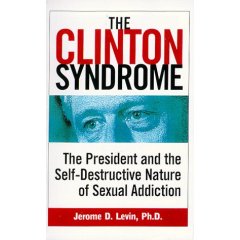
Psychologists have and - with these reminiscences as source material - will continue to explore Clinton's need for secret affairs. They have been legion but none became more public than his brief, almost impersonal encounters with the White House intern Monica Lewinsky, who gets more references in the index of My Life than Sarajevo, British prime minister Tony Blair, Camp David and the FBI.
As we might have expected, we learn nothing new.
We were never going to get an honest account from someone known as "Slick Willie" and whose autobiography reflects the character of his life and presidency, littered with self-serving excuses and evasions.
Clinton's version of the events here is slight and he adopts the moral mea culpa so common in American public life: a bland confession of misdeeds without conveying any real sense he understands the betrayals.
He writes in the same way a Hollywood A-list shoplifter or recidivist drug-abuser might plead in open court: to save his hide. 
He couches his culpability in the Lewinsky affair - and allegations from Gennifer Flowers, Paula Jones and others - in evasion and the kind of bland, self-serving confessional style familiar from Oprah and similar shows. I'm sorry, so now forgive me.
"During the government shutdown in late 1995, when very few people were allowed to come to work in the White House and those who were there were working late, I'd had an inappropriate encounter with Monica Lewinsky and would do so again on other occasions between November and April, when she left the White House for the Pentagon.
"For the next 10 months, I didn't see her, although we talked on the phone from time to time.
"In February 1997, Monica was among the guests at an evening taping of my weekly radio address, after which I met with her alone again for about 15 minutes. I was disgusted with myself for doing it, and in the spring when I saw her again, I told her that it was wrong for me, wrong for my family, and wrong for her, and I couldn't do it anymore."
Then later: "What I had done with Monica Lewinsky was immoral and foolish. I was deeply ashamed of it and I didn't want it to come out. In the deposition, I was trying to protect my family and myself from my selfish stupidity. I believed that the contorted definition of 'sexual relations' enabled me to do so."
President of the United States and the only man on the planet who doesn't consider oral sex as "sexual relations"? That's the lawyer in him talking.
While we learn nothing more of this matter, we do get an insight into Clinton's well-practiced evasiveness.
Former president Richard Nixon once famously observed that he "misspoke" himself; Clinton admits he "mistakenly said" he had never had a draft deferment during his years at Oxford. He later calls this a "misstatement".
And as in the Flowers, Lewinsky, Jones and Whitewater scandals, Clinton shifts the blame to others or tries to undermine their credibility by innuendo and downhome appeal.
Of his draft deferment - which came up when he ran against incumbent president George H. Bush - he says, "It's been suggested that Holmes [Colonel Eugene Holmes who said he had been misled by Clinton at the time] may have had some help with his memory from his daughter Linda Burnett, a Republican activist who was working for President Bush's re-election." 
Of Flowers - of whom he meekly admits, "I had had a relationship with her that I should not have had" - it is, of course, the Republicans behind it again: "Just a part of the long, well-financed attempt to damage and embarrass me personally and politically."
He doesn't see he may have done that to himself.
Anyway, "a national poll said that 70 per cent of the American people thought the press shouldn't report the private lives of public figures. In another, 80 per cent of Democrats said their votes wouldn't be affected even if the Flowers story was true."
Well, it was true, but it's hard to know what to make of a man who considers opinion polls his moral compass.
The Comeback Kid is oily, too. You can almost hear his soft southern tones as he says of Flowers still having suits against some friends and Hillary for allegedly slandering her: "I don't wish her ill, but now that I am not President anymore, I do wish she'd let them be."
Of course, there is much serious, some might say dogged, reportage of politics here: lengthy details of his various campaigns, ordinary people he met on the trail (most of whose stories he seems to have drawn moral strength from), and at times the sheer weight of the presidential office.
"The first week of May was another example of everything happening at once. I answered the questions of international journalists in a global forum sponsored by President Carter's center at CNN headquarters in Atlanta; signed the School-to-Work bill; congratulated Rabin and Arafat for their agreement on handling the handover of Gaza and Jericho; lobbied the House of Representatives to pass a ban on deadly assault weapons; cheered its passage by two votes, the the face of fierce opposition from the NRA ... "
And so it goes for another dozen lines before ending, " ... and got sued by Paula Jones. It was just another week at the office."
It is a measure of the confluences of history - and some might see the post-modern implosion of American politics and popular culture - that on one page about Lewinsky are also references to Les Miserables (Clinton's defence attorney says the pursuit of Jean Valjean paled in comparison to the hounding of the president), and Czech president Vaclav Havel, Nelson Mandela and King Hussein of Jordan, all of whom had stood by him.
In the Lewinsky affair, as in other places where he is necessarily defensive, he resorts to pulling out the famous names and power brokers who supported him.
As the storm rages good friends Tony and Cherie Blair come calling and get him laughing again. When facing the Senate trial he refers to Cheryl Mills, a smart young black lawyer who defends him.
She says, in quotes, she cannot let pass comments that his acquittal would send a message that civil rights and sexual harassment laws would be seen as unimportant.
Then, without quotation, so it is uncertain whether this is her voice or his, he writes: "Black people all over America knew that the drive to impeach me was being led by right-wing white Southerners who had never lifted a finger for civil rights".
In an astonishing twisting of context, he uses Mandela's forgiveness of his persecutors as a guiding light in his personal situation. He writes of "falling into Starr's clutches".
Some of this is either transparent nonsense or bizarre in the extreme: At Martha's Vineyard on vacation he "slept on the couch" after he finally told Hillary the full details of the stolen moments with Monica.
Was there no spare room for the most powerful leader of the free world? Humbug.
As with many biographies and autobiographies of the famous, it is their formative years which are the most engaging and interesting.
Clinton's recall of detail - family members, odd incidents, teachers, and the like - is formidable and often precise. He notes the University of Arkansas in Fayetteville, which he loved, was built in 1871 and was a unique reminder of the Civil War, "marked by two towers, with the northern one higher than its southern counterpart".
But other reminiscences have no such telling subtext, and he often stoops to dogged prose which has little point or punchline.
"One day we visited the cabin of a mountain man who had a collection of rifles and pistols dating back to the Civil War, then explored a cave the Confederates used for munitions storage."
There are too many yawn-inducing paragraphs which open like that. Indeed, the book begins with a hit of prose morphine with this meandering, all-inclusive sentence.
"Early on the morning of August 19, 1946, I was born under a clear sky after a violent summer storm to a widowed mother in the Julia Chester Hospital in Hope, a town of about six thousand in south-west Arkansas, thirty-three miles east of the Texas border at Texarkana."
And later, sparing us no detail: "I was born on my grandfather's birthday, a couple of weeks early, weighing in at a respectable six pounds eight ounces, on a twenty-one-inch frame."
But once he hits his stride Clinton, like Hillary whose Living History preceded this, writes a fast-paced narrative which veers between the gossipy and mundane, and the high-minded matters of political life.
And where Hillary seemed to believe she was a lightning rod for American society and revealed herself as utterly self-absorbed ("While Bill and I talked about social change, I embodied it," was one of her more cringe-inducing observations) her husband comes off no less at the centre of the frame.
During Martin Luther King's famous "I have a dream" speech, which he watched on television, he writes: "I started crying during the speech and wept for a good while after Dr King finished.
"He had said everything I believed, far better than I could. More than anything I ever experienced ... that speech steeled my determination to do whatever I could for the rest of my life to make Martin Luther King Jr's dream come true."
Quite an undertaking for someone who had just turned 17.
There is much in the early chapters which is revealing, sometimes perhaps unintentionally. Many will find an irony in that a man who betrayed the promise he offered was born in a town called Hope, and pop psychologists will revel in a passage such as this about his favourite movie.
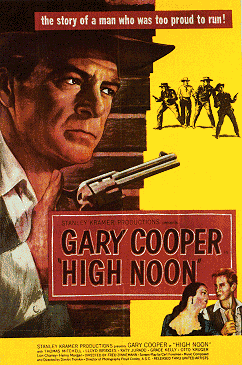 "Over the long years since I first saw High Noon, when I faced my own showdowns, I often thought of the look in Gary Cooper's eyes as he stares into the face of almost certain defeat, and how he keeps walking through his fears towards his duty. It works pretty well in real life too."
"Over the long years since I first saw High Noon, when I faced my own showdowns, I often thought of the look in Gary Cooper's eyes as he stares into the face of almost certain defeat, and how he keeps walking through his fears towards his duty. It works pretty well in real life too."
More telling is his relationship with Roger Clinton, his abusive alcoholic stepfather who would beat and, on one occasion shoot at, his mother.
Explaining why he didn't join the Masons despite being in the Order of DeMolay, an extracurricular activities organisation run by them at his school, he says he didn't need a secret brotherhood, he had plenty of secrets anyway.
It is the most revealing passage in a hefty hardback which is rarely revelatory and is often sniping and self-serving.
Clinton met president-elect George W. Bush while he was putting together an experienced team from past Republican administrations (Clinton concedes he didn't spend enough time assembling a good team on taking office) but is concerned they see Iraq as one of the biggest threats to security.
"I told him that based on the last eight years, I thought his biggest security problems, in order, would be Osama bin Laden and al Qaeda; the absence of peace in the Middle East; the standoff between the nuclear powers India and Pakistan, and the ties of the Pakistanis to the Taliban and al Qaeda; North Korea; and then Iraq.
"I said that my biggest disappointment was not getting bin Laden ... He listened to what I had to say without much comment, then changed the subject to how I did the job."
At such times there is this frisson of historical relevance but too often My Life is hucksterism of the kind a Southern boy knows well.
And snake oil can always come at a knock-down price.
On Wednesday when My Life was released Whitcoulls had already priced it at $39.99 rather than the recommended retail price of $65.
The sales pitch in the window isn't disingenuous. To a considerable extent My Life is about power and politics.
The jury is still out on whether the sax was any good.

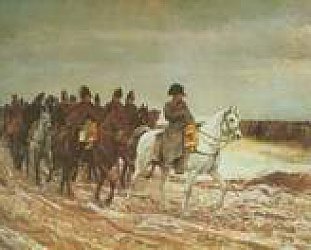
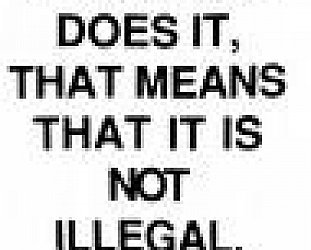

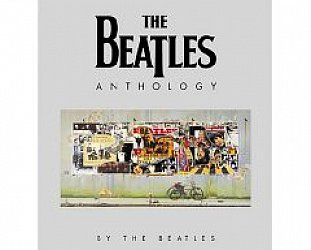
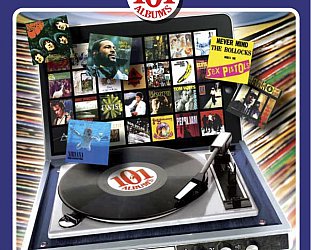

post a comment